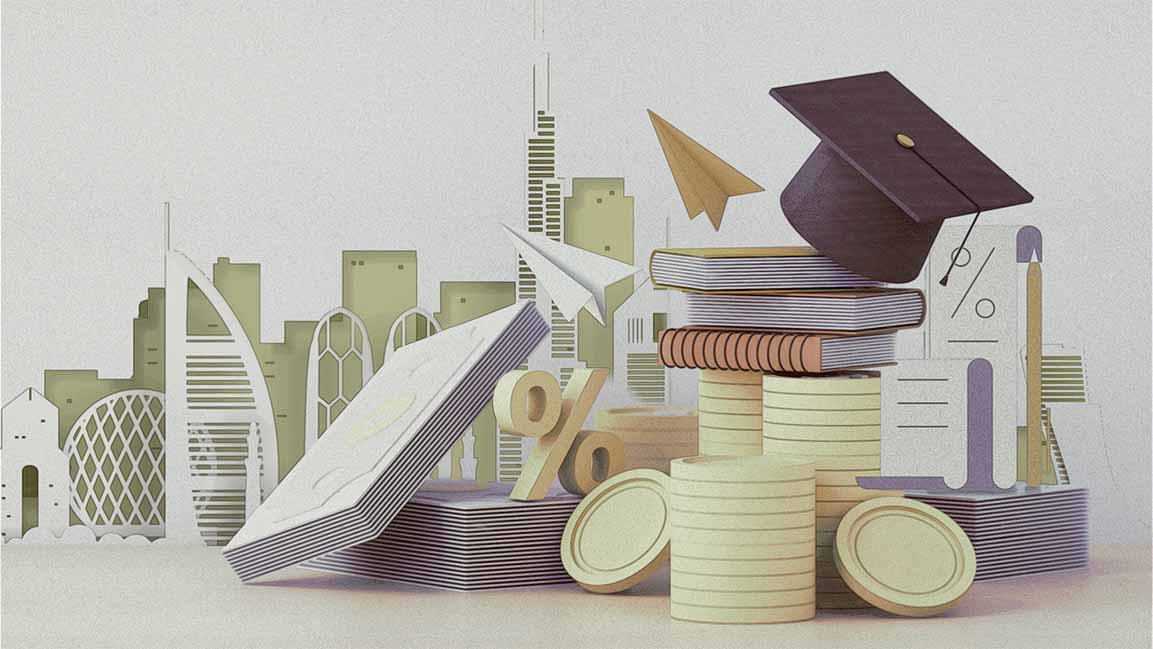- | 9:00 am
Why are school fees in the UAE so high?
As the cost of living rises, school fees are a burden to parents.

School fees have been soaring in the UAE — at more than twice the inflation rate — putting an extra burden on parents.
On average, private school fees range from approximately $9,500 to $32,600 annually, comparable to many international colleges. With the lowest annual salary in the UAE amounting to $13,000 and the middle-level annual salary being an average of $60,000, half of one’s living costs could go towards school fees.
There isn’t any sign of slowing down. In the 2023-24 academic year, private schools in Dubai can increase tuition fees up to 6-7%, according to the Knowledge and Human Development Authority (KHDA), the educational quality assurance and regulatory authority of the Government of Dubai.
“Kids are getting educated, but not enough to cover such extravagant fees,” says Serena, whose son is an FS2 student at a school in Dubai with a British curriculum.
This is the general mood of the parents of school-going children in the country.
Meanwhile, demand for schools continue to increase. In the GCC, schools are likely to increase from an estimated 34,081 schools in 2022 to 35,208 by 2027. This demand is especially significant with private schooling, anticipated to grow at a rate of 1.5% during the forecast period, according to the GCC Education Industry report.
“The demand for high-quality private education reflects parents’ desire to invest in their children’s future,” says Jonathan Bramley, Vice President of Communications at GEMS Education.
“Many parents switch to private provision because of challenges in the public schools, where teachers and resources are stretched.”
Krishna Dhanak, Managing Director at Alpen Capital, says another factor for the rising demand for private schools is the increasingly diverse population in the region, resulting in several curricula such as British, American, Indian, International Baccalaureate (IB), Canadian, French, and German gaining prominence.
“These curricula are sought after by expatriates and locals alike to keep pace with the expanding societal demands and prepare for career opportunities,” adds Dhanak.
INVESTING IN TECHNOLOGY
In the competitive education sector, schools face high operational costs and a shortage of teaching talent. Integrating edtech platforms also adds a cost to tuition fees.
“GEMS has invested heavily in technology to ensure our students enjoy the latest classroom tools available to augment the most important resource of all our classroom teachers,” says Bramley about the proportion of fees allocated towards adopting technology in the classroom.
This is paradoxical in theory for most parents. “If tuition fees are supposed to be for their education, then why are we paying extra for the e-learning sites where our kids spend most of their time with our help? Lately it seems we are doing most of the work,” says Serena.
After the pandemic, few private school operators began providing discounts and incentives on school fees, and some offered personalized payment plans and deferment of fees to combat the fall in enrolments. This impacted profitability, straining revenues and derailing the expansion strategy for the operators.
“Our fees vary widely across our 42 schools in the UAE. Our most affordable school starts at considerably less than $272 a month in Grade 1,” says Bramley. “Our fees are competitive rather than high.”
The UAE, Bramley adds, has a healthy, competitive private education sector with high-quality private schools to suit all budgets.
“We think the value for money parents receive here is exceptional, especially relative to students’ outcomes.”
Although, Serena disagrees. “My highest expense is the school fees, which include tuition, uniform, book and supplies, e-learning site, transportation, and app fees.”
She also questions fees parents pay for school supplies and books, as kids are given projects to work on that require an extraneous expense. “Parents are constantly running errands for supplies required to complete the projects, and we are paying almost $250 per term extra for this. It’s unfair.”
It’s a no-win situation.
REGULATION OF FEES
School operators say various factors like economic conditions, curriculum, infrastructure facilities, and quality of offerings drive tuition fees.
Operational finances must be considered, especially hiring and retaining human capital, one of the sector’s major challenges.
In the UAE, regulatory authorities, such as KHDA and ADEK, are responsible for approving fee ranges for new schools and reviewing schools to set a range and guidelines in which fees can be modulated per school based on their rating.
“Where appropriate, the authorities have also intervened and regulated fee increases, as witnessed over the last few years. Along with such governance, the market demand and supply dynamic strongly determine tuition fees,” says Dhanak.
This year, school operators were able to increase fees by between 2-4% after 2019.
“Like everyone else in the country, we also face rising costs. Our rent, utilities, medical insurance, technology expenses, and all other costs increased yearly. We also need to reinvest in buildings and facilities each year, and this is an expense that is also inflating,” says Bramley.
He adds that the largest expense is teachers’ salaries. “Competitive teacher salaries that keep up with inflation are vital.”
High costs on parents and schools aside, Dhanak says education in the UAE offers a multicultural atmosphere and world-class infrastructure, which will keep the influx of students coming into private schools.
*Names are changed on the parents’ request. KHDA did not respond to the Fast Company Middle East’s request for comment on time.








































